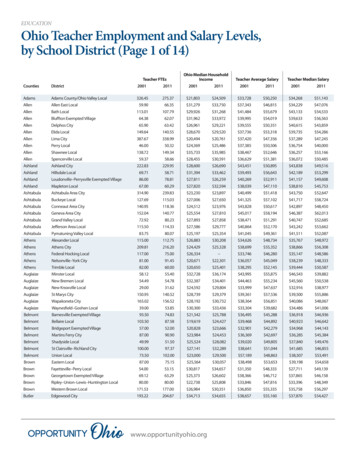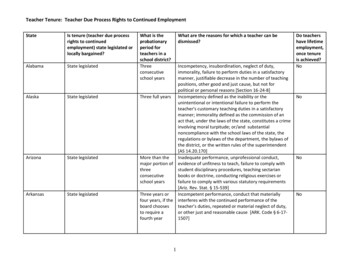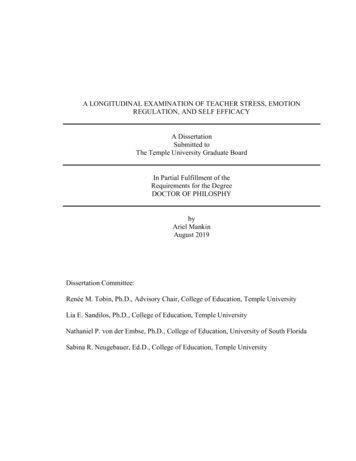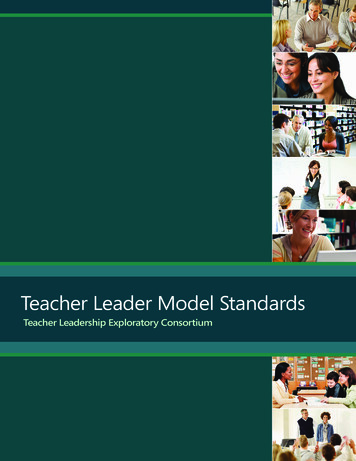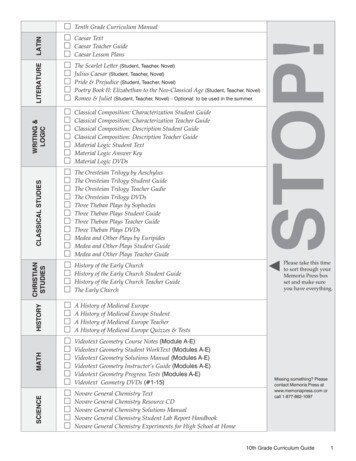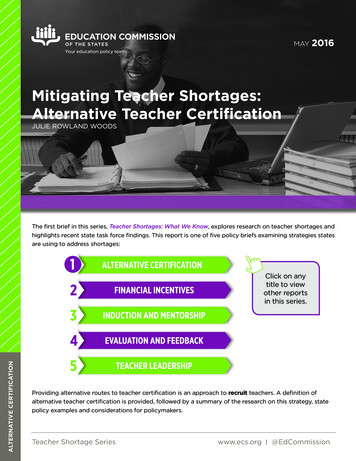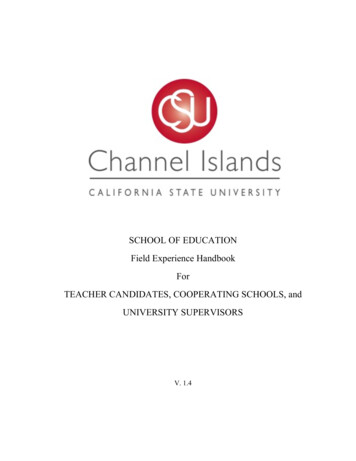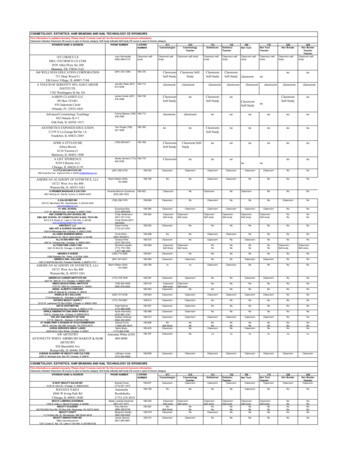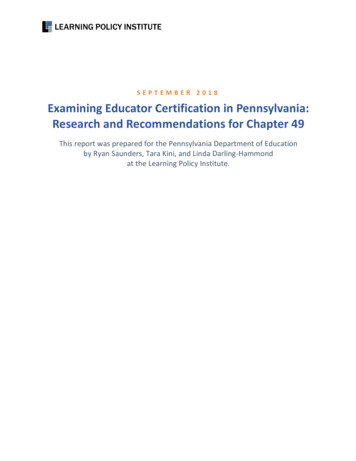
Transcription
International Journal of Humanities Social Sciences and Education (IJHSSE)Volume 2, Issue 10, October 2015, PP 111-124ISSN 2349-0373 (Print) & ISSN 2349-0381 (Online)www.arcjournals.orgThe Role of the Teacher: Philosophical PerspectivesMartin BandaDepartment of Educational Psychology and SociologyKwame Nkrumah University, Kabwe, Zambiawodwala@gmail.comPaul Peter MutamboDepartment of LanguagesSocial Sciences and Business EducationKwame Nkrumah University, Kabwe, ZambiaBeyond the walls of our schools, the world is changing dramatically; and is pushing and pressing down hard onthose who work within. Rather than hiding from or shutting the classroom door on these external changes anddemands, more and more teachers and head teachers are reaching out to people and organisation beyond theschool- to parents, communities, businesses and the wider profession. They are searching for new and betterways to enrich, stimulate and support their own increasingly difficult and challenging work. Yet these effortsoften prove disappointing. Promising partnership fizzle out because of lack of interest, they erupt intounexpected conflicts when people’s purposes are at odds with each other; they are dogged down inbureaucracy; or they subordinate educational integrity to the moneymaking opportunities of the market.[A. Hargreaves and M. Fullan]Abstract: The article examines a cohort of graduate’s perspectives of their role as teachers. It placesgraduates’ experience at the centre of their role. The article was written with the consciousness of the twointerests: that the findings may reveal some similarities in philosophical perspectives between our respondentsof the first cohort (2009-2013) at Kwame Nkrumah University and those of other universities or colleges ofeducation in the country and secondly, that it brings out the unheard and often overlooked graduates’ voiceabout their role. The first cohort was significant for the article as they had no reference of the previous groupsunder the degree program. Their thoughts about their role had novelty. A comparison is made between personaland public roles and how these roles affect the teacher’s life at home and at work. The conflicts that arise fromthe clash between the two roles are also discussed.This has been done in order to show changes that have takenplace from the pre-industrial era to the present day and focus for the future. A teacher in traditional society wasmainly concerned with bringing up a child in a morally good society and prepared him or her for life-longactivities. That of the intermediate societieswas mainly concerned with transmitting knowledge and culture tochildren of the elite groups while teachers in industrial society were concerned with the development of skills inconformity with the development of industries. The teacher of today and tomorrow takes the role of facilitator ofknowledge.Keywords: Role, Social Status, Social Role, Role Conflict, Inter-role Conflict, Intra-Role Conflict, Role set.1. THE HISTORICAL NOTE OF THE ROLE OF A TEACHERThere are so many perceptions about the role that a teacher plays in society, varying from onecommunity to the other. The way a teacher is looked upon in traditional society for example may notbe the same as that in developed societies although generally the roles are the same. Datta (1984; 115)views the perception of “one‟s position in society as depending on the social status that is occupied bythat person in the social system and the factors that determine the status of an occupation as being thatof remuneration, the working conditions, the qualifications and experience, the amount of moneyspent on it by the state, the social influence exerted by members of the occupation as a group, andcontemporary societies.”The teacher‟s remunerations in most countries in the world are far below other professions. This hasadversely affected the performance of many teachers as they spend most of their time outside theschool schedule doing their own business. In Zambia for example, most teachers spend a lot of timedoing part-time work and conducting extra lessons just to get extra money to sustain their living. The ARCPage 111
Martin Banda & Paul Peter Mutamboteacher is therefore pre-occupied with work outside his or her occupation thus giving the child verylittle attention. In most cases the working conditions are not good enough for qualified teachers. In themajority of third world countries, though there are no statistics, teachers are either accommodated indilapidated houses or have none at all. Many end up joining the many disadvantaged people in theshanty compounds. This adversely affects teaching because most of the times the teacher will bethinking about the safety of family. There are other conditions of service that are mentioned only onpaper but do not exist in reality. The Zambian situation is an example where a teacher can go on leavebut still not get the leave benefits. This may drag on until one retires from the service. This is veryunusual in other professions.While the qualification of a teacher is a factor in the promoting of a worker in some countries, theZambian system until recently placed much emphasis on experience and this discouraged most of thegraduates from universities from joining as their qualification was rarely recognized. On the otherhand, until the late 1990s, very little money was allocated to Ministry of Education hence all workthat was supposed to be done would be left hanging because of insufficient funds.There is also the issue of social influence exerted by members of the teaching fraternity where withinthe group; some enjoy upper social status while the rest are in the middle and lower categories. Inmost cases, this relates to the level at which one is teaching, from third level, second level or firstlevel respectively. For example, one at secondary school will look down on a teacher at primary leveland likewise one at secondary school will be inferior to one in college. This is not the way the systemshould be because each of the above groups has their own specific training and more of them canoperate without the participation of the other. Suffice to mention therefore, the above factors affectoccupations in many different ways depending on the society in which they are situated.The differences in the way teachers approach their work is therefore evident. A teacher in Africa andZambia in particular is still looked upon as a disciplinarian in and outside the classroom and learninghours. He or she can discipline the pupil regardless of where the offence is committed as long as itcontravenes any of the school rules. In doing so, the teacher is playing the role of a parent who is notalways with the child because in most cases, the child spends most of the time in school. In othersocieties however, whatever the pupil does outside school premises is not the teacher‟s concern andhas to be dealt with by the authority concerned. The teacher also transmits knowledge throughmediation. The role is general to teachers around the world and cannot be disputed. Being a judge isanother sub-role a teacher plays in the school environment in connection with discipline. He or she issettling „cases‟ every day. The teacher decides what is right and what is wrong in the life of a pupiland at the same time sympathizes and understands the pupil‟s problems so that the latter can haveconfidence in him or her. Most of all, a teacher is expected to exemplify the moral values of thesociety where he or she lives and works. The teacher‟s affection towards a pupil should be that oftrying to bring up the child in a morally sound environment so that the learner can contribute tosocietal needs after school.As earlier alluded to, a teacher‟s role is multifarious because of the absence of a set of tasks that areperformed within a set of time, or formal limitations to the roles like those of a doctor or lawyer whoare confined to the hospital and the court respectively. A teacher on the other hand plays the role ofalmost all the other professions because of the diversity of subjects that are taught in schools. Forexample, Datta (1984; 118) identifies some duties of the teacher in the African context as “firstly toteach; secondly a teacher is an agricultural officer because he or she teaches methods of farming andthe implements that go with it. He or she is also a medical officer because the teacher offers first aidbefore referring the pupil to the hospital and also acts as police officer in seeing to it that pupils aretrustworthy and obedient. Further, a teacher may be a judge presiding over cases and makingdecisions, a forest guard, looking after trees around the school and beyond, road engineer teachingpupils to repair and construct pathways and a coach training pupils in various games.” There are otherduties too numerous to mention here. Waltkins, (1963) writes about the African teacher: He has amajestic status in society, is respected by the chief and the elders of the tribe, and is honoured withintense devotion by the youth of the land. In personal characteristics, he must be chivalrous,courteous, public spirited, law-abiding fearless. He must be well versed in the history and traditions ofhis people and an authentic judge of matters affecting their welfare. Other men of good repute who arespecialists in various fields serve as assistants and teachers as novices.In the traditional African set uptherefore, the status of a teacher is very high and is viewed as one that should produce good andexceptional members of the society.International Journal of Humanities Social Sciences and Education (IJHSSE)Page 112
The Role of the Teacher: Philosophical PerspectivesTo the contrary, in the intermediate societies like those of ancient Egypt, China, India and the RomanEmpire, the teacher was most importantly the transmitter of knowledge and culture of the elite groupsto their children and parents made sure that this was done according to their will. Hoyle (1969)describes the British teacher in pre-industrial societies as being concerned with the transmission of ahigh culture and particular set of values to the children of the elite groups, concentrating on theunchanging knowledge of classical languages and literatures. The teacher also acted as clergymanwho taught in public and grammar schools emphasizing moral values and vocational training. In thelatter, pupils were taught skills like carpentry and building construction, which were life-long skills.As noted earlier, in traditional African societies, education was and is mainly concerned with thetransmission of values while that of skills occurred and continues to occur through day to day trainingand by watching the older ones performing their tasks. In this sense, the elders acted as teachers and atthe same time as instructors. There is evidence from the transition period of the tradition tomodernisation regarding the shift from the emphasis on learning to that of teaching, although theteacher may set up learning tasks as opposed to teaching by direct method (Hoyle, 1969; 12).2. SOME CONTEMPORARY VIEWSAccording to Drudy and Lynch (1993; 101), “roles prescribe certain ways of behaving hence teachersmay have different teaching roles, depending on the type of institution and the level at which they areteaching. Indeed, teacher at kindergarten, primary, secondary and colleges may have different rolesalthough most of the roles may generally apply to all.”Delamont in Drudy and Lynch (1993; 102)identifies two characteristic features of how roles in teaching are enacted. These features are those of„immediacy‟ and „autonomy‟. The earlier she says, decisions by the teacher have to be immediatebecause of the direct contact with the pupils as opposed to say a doctor who sends patients to hospitallaboratories for the tests before prescribing medicine for them. Delamont also refers to a lawyer whocan consult a colleague for a second opinion before going to defend a client. The teacher however, isusually alone in the classroom and may find it awkward to go outside and seek the opinion of othercolleagues. The decisions are therefore made on the spot. On the other hand, teaching can be aprofession of autonomy and isolation. The teacher has authority over many aspects of pupils‟ livesand this is commonly reflected in behaviour, speech and clothing. The manner in which the teacherbehaves and dresses will have an impact on the behaviour and dressing of the pupils as well.Kelly (1970) noted a dominance of unspecific, diffuse obligations of a teacher, focusing theperception that a teacher‟s role is that of responsibility for broad, more, religious and intellectualdevelopment of pupils, and giving of good example in schools. MoE(1992) regards teachers as key indetermining whether the school can bring its undertaking to fruition. Teachers direct children‟sintellectual formation and promote their desire and ability to learn and they also choose the methodsof instruction appropriate to the child‟s needs.The role set is the organizational set up and the community in which the profession is being practiced.In the teacher‟s case, the role set comprises the head teacher or principal; the deputy, members of staffand the supporting staff. In essence, all those colleagues who are in the same teaching community atthat particular institution and elsewhere are embedded in this category.3. THE PHILOSOPHICAL PERSPECTIVEAccording to the Wikipedia free encyclopedia, philosophy is the study of meaning and justification ofbeliefs about the most general or universal aspects of things- a study which is carried out not byexperimentation or careful observation, but instead by formulating problems carefully offeringsolutions to them, giving arguments for solutions, and engaging in the dialogue about the above .However, the concern in this article will be with the philosophy of education, a branch involving thestudy of purpose and the most basic methods of educating and learning. Particular attention will bepaid to the role of a teacher in the philosophical perspective.The discussion will be based on two texts: Firstly, we discuss the views taken by Downie, Eileen,Loudfoot and Elizabeth Telfer in Education and personal relationships and secondly, Eric Hoyle‟sThe Role of the Teacher. The discussion will hinge on their ideas and how they apply to the schoolsystem. The article also brings up examples from current situations prevailing in schools and thechallenges that lie ahead in the teaching profession. While doing so, a critical analysis of the ideasfrom the texts will be made and where possible alternative suggestions will be advanced. A number ofissues will be discussed and these will include the concept „role‟ as used in relation to teaching, theInternational Journal of Humanities Social Sciences and Education (IJHSSE)Page 113
Martin Banda & Paul Peter Mutamboprivate views of the teacher encroaching on his or her public role, the role relationship between theteacher and the pupil, the private activities of a teacher and the way they may affect his or her publicrole and personal relationships. In the second part of the chapter, emphasis will be on the roles of theteacher in the school and these will include specialist roles, professional roles, formal and informalroles and the performance of the teacher in the classroom.4. THE CONCEPT ‘ROLE OF A TEACHER’In their discussion of the concept, Downie et al (1974) begin by distinguishing the different sensesrelated to the idea of the teacher‟s role. These are divided into four categories. Firstly, „role‟ is widelyused as class concept where individuals are seen in virtue of certain properties they have in common.This can be exemplified in groups that share a common goal like the role of a basketball player,doctor or indeed a teacher. However, this sense only describes the role in terms of things that arecommonly held together and hence may not be very helpful.The second sense is more specific and brings out the association of „role‟. This refers to an expectedpattern of behaviour. This pattern can be predictive or normative in sense. In this case, a teacher issaid to be playing the „role of a teacher‟ and people expect him or her to behave accordingly althoughthe teacher may not be aware of these expectations. This implies that there are rules that they shouldand should not be seen to follow in society. If they do anything that society does not approve of, thenthe teacher is likely to face censure. The argument however, does not explain why society acts asspectator and why the expected behaviour pattern refers only to a particular role and not another. Thepoint is that there are many behavioural expectations from the teachers as opposed to other roleoccupants. On the other hand, a teacher must also know what society expects of him or her.The third concept is that of „role‟ as a social function. A person‟s role in society is viewed as thefunction he or she performs, the contributions made to the maintenance of the social system. Inessence, this sense is concerned with the actual effects of a person or an institution in society. Ateacher has social function to play and this is to bring up the pupil in socially sound environment sothat the pupil does not lead a life that is against the norms of a good society. In a school, there areusually one or two pupils who may be „clowns‟ in some sense. The role of these, though theythemselves may not be aware of it, is to release tension in the school especially during stressful timestowards examinations. Downie (1975) gives an example that a sociologist may see a criminal ashaving the role of preserving the equilibrium of society though the criminal may not be aware that hisactions might have such an outcome.The fourth sense is defined in terms of rights and duties, which describe and explain the operation ofinstitutions and why a person in a certain position in society may legitimately do certain things. It is inthis vein that teachers have been put in a position where they are bound to adhere to certain rules ofsociety that other professionals may go against unnoticed. Loudfoot (1972), however, has somereservations about the role defined in this sense. She says not all jobs can be defined in terms of rightsand duties and gives an example of a musician who in a sense is like an individual in his role.Secondly, she mentions that there should be a distinction between the highly structured, narrowlydefined role where rights and duties are explicitly stated and role defined in the wider sense wherespecific obligations are also included. A closer look at the rights and duties will yield better results inour understanding of the subject.In other dispensations of his or herduties, the teacher needs to possess skills relevant to the teachingand to the achievement of the aims of teaching. Downie et al have distinguished between„determining‟ and „accessory‟ rights and duties that make up the role of the teacher. Determiningrights and duties are those that determine an official position or sphere of action of a person in societyin which case they are constitutive of the role. In the case Zambia, these are outlined in thegovernment‟s „General Orders‟ in which rights and duties are laid down for all governmentemployers. All government workers are expected to work within this order, failure to do so may leadto a penalty. Accessory rights and duties on the other hand arise when a person occupies a particularposition in society. They do not determine the role but arise, or may arise, because he or she has therole in question. There are many cases of duties. A primary school teacher for example is trained toteach all the subjects offered at this level, as well as taking account of the psychology of the growingchild through the application of psychology theory. However, nothing much is said about how tohandle particular cases. The teacher deals with such situations according to what he or she thinks isright at that particular instance. A secondary school teacher on the other hand is trained to teach oneInternational Journal of Humanities Social Sciences and Education (IJHSSE)Page 114
The Role of the Teacher: Philosophical Perspectivesor two subjects(s) of specialisation. Emphasis is on the content and background of subject(s) and onthe education courses, which include psychology, sociology and philosophy. However, when theteacher graduates, he or she is found in situations where one has to play a part in other extracurricularactivities acting as hostel counsellor, club co-coordinator, production unit manager, tuck shopmanager and many more. All these can be grouped as accessory duties.Within the area of rights and duties, Downier and his colleagues have gone further to distinguish twogeneral kinds of determining rights and duties in terms of their source.The first they call contractual right and duties, which are owed to theemployer and have their originsin a contact of employment and as such may vary according to particular terms of contract .Theteacher therefore, finds himself or herself bound to laid down procedures concerning rights regardingwhen to go on vacation, the number of working hours, the allowances and other conditions of service.„„Implicational‟‟ determining rights and duties derive from the nature or aims of teaching and areowed by the teacher to the pupil and society.Duties here exist uniformly for everyone in a given roleby virtue of aims of the role.In other words, this type is general in the teaching profession as itinvolves the teacher as an individual and what teaching is about, unlike contractual which varies fromone country to another depending on the economy and the conditions laid down for employees.A person accepting the role of teacher has a duty to fulfil the educational needs of those in his or hercharge that is the duty to educate the pupils. If the teacher allows the pupil to do things contrary totheir educational needs, then he or she is failing in his or her duty towards the pupils. However, whilethe teacher has duties to the pupil, the latter also have duties to the teachers. As a member of a schoolor institution, the pupil has a duty to obey the instructions of the teacher. These should, however, bewithin the scope of the teacher‟s authority. Again here there is a difference between a third levelstudent who goes to college by choice and first and second level pupil who is at school not by choicebut by obligation. The duties to the lecturer will therefore be different from those to the teacher‟s atlevels one and two. For example, while the learner at third level will have freedom to cut through thelecturer‟s speech with a question‟ that the other at first and second level may not be in that position. Ingeneral, the learner has a duty to listen to the educator because the latter helps him or her to fulfil thedevelopment of his or capabilities in school.In order to fulfil the aims of education, both the teacher and the pupil should help in theimplementation of their duties and rights. Thus pupils should be able to obey the teacher‟s instructionwithin the latter‟s authority while the teacher, in his or her dealing with enthusiasm matter shouldshow respect in the treatment of it and teach with enthusiasm for the benefit of the pupil.The discussion above has reviewed the sense of the „role‟ as used in teaching. This part has alsolooked at the rights and duties of the role of the teacher and examples have been given in some cases.Mention has also been made of the distinction between contractual and implicational determiningrights and duties that make up the role of teacher. The next sub-section seeks to explore the privateviews of the teacher in relation to the performance of his or her public role.5. CONFLICT BETWEEN PRIVATE VIEWS AND THE PUBLIC ROLEThe idea of „role‟ can be regarded in terms of a set of rights and duties. These rights and duties mayeither be determining or accessory. The former define the nature of the position and are usually agreedupon by a wider audience, while the latter derive from the nature of the aims of teaching. When thereis no agreement between the two, then conflict is likely to arise for the role-occupant.It is therefore, important to consider that the individual teacher will have certain personal beliefs andconvictions that may come into conflict with what is required to fulfil his or her role. This conflict canarise within the actual school situation between the teacher‟s interpretation of the role and the role asdefined by the school management and secondly, because the out-of-school activity of the teachermay be regarded as being relevant to the enactment of that role (Dodd, 1982). In this situation, theteacher‟s personal views may come into conflict with those of the administration. For example, in oneof the second level schools a situation arose where the teaching of Religious Education almost cancame to stand still. Protestant teachers might optto teach the syllabus that was related to bibleknowledge but the catholic teacher might teach conventional Christian Living Today syllabus.Because he was in minority, the latter just decide to drop the subject and concentrate on the other onethat he was teaching. This particular teacher may have bowed to the majority but on the other hand hisright belongs to religious group and the duties to educate the pupils were infringed. The best way toInternational Journal of Humanities Social Sciences and Education (IJHSSE)Page 115
Martin Banda & Paul Peter Mutambohave approached the issue in a critical view was to pick one class and give it the syllabus that wascatholic oriented. Another incident is where a teacher is instructed to take pupils on a fundraising tripinvolving manual labour. The teacher may find him or herself in disagreement with the administrationbecause pupils may already have paid for various services in the school (to the teacher‟s knowledge)and hence could think of fundraising as unnecessary. Again in this case, while the teacher‟s view maybe genuine, the management will refer to the terms of doing any duty as determined by the superiors.While doing so, the management will be taking away some rights of the teacher.The reactions to conflicts that arise in the school situations are twofold. Downie et al call the first„ignore-your-own- attitude‟ and the second, „resign - if- you- disagree „. The first one means that theteacher ought not to have a view of his or her own because doing so will have bad consequences forhim or her. While this view indicates that teachers should not only enact those views that theypersonally agree with but also listen to other people‟s views, it is obvious that in some cases, theteacher may have a genuine view but will tend to ignore it just to avoid conflict. In my view, the„ignore-your-own –attitude‟ can lead to the teacher taking a subtle stance in all issues that may be ofimportance for fear of conflict. It may also be possible that the teacher will not contribute anything tothe development of the institution if one takes this view. On the other hand, one might say it isjustifiable to ignore one‟s views and implement the disputed policies rather than come into conflict, asindicated in the example of the Catholic teacher who dropped teaching Religious Knowledge to avoidconfrontation with his protestant colleagues, although at the same time his rights of choice wereinfringed.The „resign-if-you-disagree‟ view leads to discontinuity on the part of the pupil‟s education and theteacher may find him or herself in an awkward position of not finding another self-sustaining job. Buton the other hand, if one has to act responsibly, then his or her views have to be taken into account.Take the example of Teacher X who is given the responsibility of Boarding Teacher. This teacherprepares the budget and the menu for the pupils. While he does all this, other people who do not insome cases comply with the teacher‟s budget do the buying of food. These other people do this partlyto benefit themselves. Because the boarding teacher is not consulted on what is bought, he decides toresign his post and leave the post to the buyer. He has done this to avoid conflict because according tothe terms of a boarding teacher, one should do all the duties mentioned above and therefore, tomaintain his credibility, the teacher opts to resign his post as boarding teacher.The „ignore-your-own- attitude‟ view is not always a good alternative to decision making because thisin most cases would lead to many developmental ideas being ignored. Therefore, this attitude shouldbe the last decision to make after exhausting all possible avenues of resolving a conflict. Manyteachers have brilliant ideas that would go to waste if this attitude was maintained. There should,therefore, be a balance between the teacher‟s views and those of the management in order forinstitutions to run smoothly. On the other hand, all the actions taken by the teacher must be for thegood of pupil and not self-satisfaction of the teacher. Basically the teacher is there for the pupil andwhatever the former does, should end up benefiting the latter. By opting out, the teacher may leaveout the role open for some with less concern than he was. While this is true in some case, teachersshould not be held responsible for resigning position if their rights are infringed. The other context inwhich there may be conflict between the teacher and public or official demands is that of relationshipbetween the teacher and pupil. This has created a lot of misunderstanding in the teaching profession.The article explores what relationship is and the way it should be viewed.6. ROLE RELATIONSHIP BETWEEN TEACHER AND PUPILRelationship is the way, in which two or more people or things are connected, or the state of beingconnected, or still, the way in which people or groups regard and behave toward
ISSN 2349-0373 (Print) & ISSN 2349-0381 (Online) www.arcjournals.org ARC Page 111 The Role of the Teacher: Philosophical Perspectives Martin Banda Department of Educational Psychology and Sociology Kwame Nkrumah University, Kabwe, Zambia . and likewise one at secondary school will be inferior to one in college. This is not the way the system



